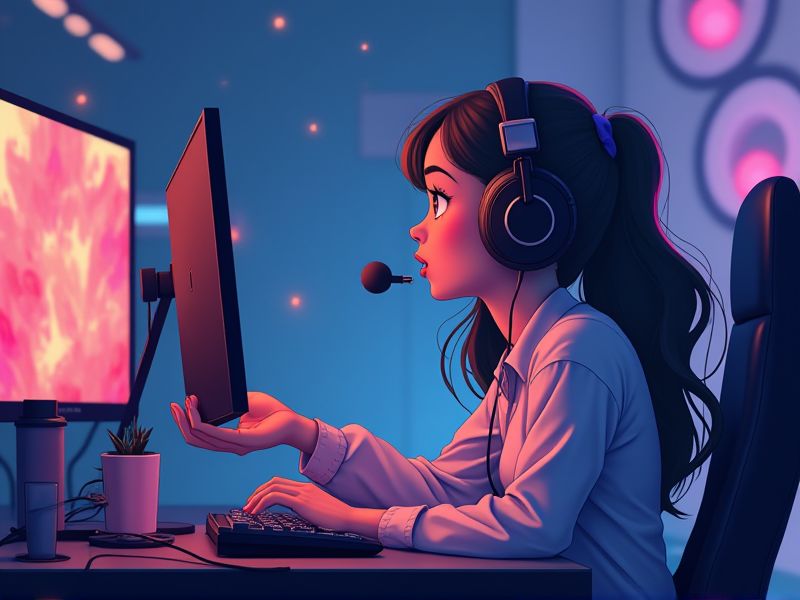
Improving at video games often requires a mindset similar to what Kratos from *God of War* emphasizes: "Don't Be Sorry. Be Better." This quote highlights the importance of learning from mistakes rather than dwelling on them. In video games, players frequently encounter challenges that require persistence and improvement, such as mastering complex mechanics or overcoming difficult levels. By focusing on improvement rather than regret, gamers can enhance their skills and enjoy a more rewarding experience.
How to Be Better at Video Games
Practice consistently
Consistent practice refines both technical skills and game sense, ensuring that strategies and responses become second nature. Repeated gameplay enables identification of personal weaknesses and fosters targeted improvements through trial and error. Regular sessions help establish mental and physical routines that enhance coordination and decision-making under pressure. Pairing deliberate practice with tailored feedback expedites progress, making overall performance steadily stronger over time.
Understand game mechanics
Understanding game mechanics gives players the insight needed to exploit in-game systems and adapt strategies effectively. By comprehending how characters, weapons, or abilities interact, you can identify patterns that lead to better decision-making during gameplay. This knowledge allows you to pinpoint weaknesses in your play style by comparing your moves against optimal mechanics-driven tactics. Regularly reviewing updates, guides, and data statistics ensures that your understanding evolves alongside the game, continually boosting your performance.
Optimize in-game settings
Tailoring your graphics settings can boost your frame rate, reducing lag and sharpening response times. Adjusting resolution and texture quality to match your hardware specifications frees up system resources. Disabling non-essential visual effects channels performance into achieving smoother, more competitive gameplay. Customizing controls and sensitivity further refines the balance between clarity and reaction speed in high-stakes situations.
Analyze gameplay performance
Recording gameplay footage and reviewing it allows you to identify patterns that lead to both success and failure. Utilizing analytics tools to measure metrics like kill/death ratios, accuracy, and reaction times helps isolate the specific areas where adjustments are needed. This data-driven analysis informs targeted practice sessions that address identified weaknesses and reinforce effective strategies. As a result, you create a continuous feedback loop that steadily enhances decision-making and overall performance.
Set specific improvement goals
Define clear, measurable targets for each skill you want to improve, such as reaction time, precision, or tactical decision-making. Break down these improvements into specific, attainable milestones that you can track over time. Using in-game statistics and performance data to monitor progress allows you to adjust your practice regime dynamically. This structured approach ensures that every training session is aligned with concrete objectives, leading to more focused and efficient gameplay improvement.
Adapt strategies dynamically
Adapting strategies dynamically in video games allows you to respond effectively to opponent tactics, leading to improved in-game performance. When you analyze real-time data, you can identify emerging patterns that signal when to shift gears or try new approaches. Frequent adjustments based on situational changes enhance your ability to outmaneuver competitors and preserve strategic advantages. Continuous reassessment and flexible planning create a cycle of improvement that directly contributes to overall gaming proficiency.
Engage with the gaming community
Engaging with the gaming community provides diverse perspectives that can help you uncover new strategies and tactics. By joining forums, livestreams, or dedicated social media groups, you can learn firsthand from experienced players and industry influencers. This interaction not only refines your technical skills, but also offers insight into game updates and emerging trends directly from the source. Embracing collaborative feedback and challenges within the community creates a continuous learning loop, ensuring steady growth as a gamer.
Focus on team communication
Focus on clear, concise communication to coordinate strategies and actions with your team. Data shows that effective verbal cues and real-time updates can increase win rates by up to 20%. Coordinated communication minimizes errors during complex scenarios, ensuring your team executes precise maneuvers. Fostering a culture of accountability and openness has a measurable impact on overall game performance.
Maintain mental and physical health
Maintaining mental and physical health enhances video game performance by boosting cognitive capacity and reaction times. Regular exercise increases blood flow and improves hand-eye coordination, critical for executing precise in-game movements. Balanced nutrition and proper hydration support sustained focus and quick decision-making during long gaming sessions. Consistent sleep and strategic breaks reduce mental fatigue, enabling faster learning and retention of complex gaming tactics.
Embrace constructive feedback
Constructive feedback offers targeted insights, allowing you to fine-tune your gameplay by understanding both your strengths and areas needing improvement. Listening to teammates or coaches helps you gather diverse perspectives about your decision-making and in-game strategies. Evaluating critiques objectively encourages the development of adaptable routines and better responses under pressure. Regularly applying feedback creates a positive cycle of learning that consistently enhances your performance over time.
Summary
Consistent practice builds the muscle memory and reflexes essential for peak performance in video games. Understanding game mechanics deepens your strategic insight, allowing you to adapt quickly and troubleshoot on the fly. Optimizing in-game settings minimizes technical distractions and enhances overall control, contributing to smoother gameplay. Integrating these strategies creates a robust framework that drives continuous improvement and competitive edge.
